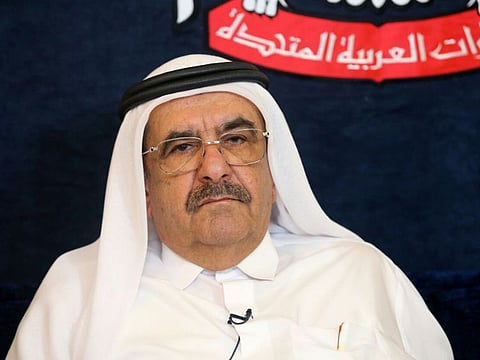Dubai Deputy Ruler Sheikh Hamdan Bin Rashid was also the longest-serving finance minister in the world
Five decades of Hamdan's leadership leaves behind an unmatched legacy of economic reforms

Dubai: The late Sheikh Hamdan Bin Rashid Al Maktoum, who was the UAE’s Finance Minister for the past five decades, was the longest serving finance minister in the world. He leaves behind an unmatched legacy of economic reforms.
The UAE, in its 50th year of being a federation, had witnessed huge economic transformation over the years accompanied by continues fiscal reforms that were spearheaded by Sheikh Hamdan at the helm of the ministry.
Rigorous planner
Remembering his contributions to policy formation and building of the economic framework of the country from the early days of the formation of the Union, the Ministry of Finance said: “The founding of the UAE to date, Sheikh Hamdan bin Rashid Al Maktoum had pivotal contributions in formulating and devising financial policies that meet the requirements of the UAE’s sustainable economic and social development.”
In addition to improving the effectiveness of financial planning and implementation of the federal budget and unifying policies, Sheikh Hamdan was keen on directing public spending to support vital economics sectors for the wellbeing of the society and sustainable economic growth of the nation.
His directives developed efficiency of cash management through the application of zero-based budgeting and switching to accounting principles on an accrual basis. That, in addition to ensuring the sustainability of the federal government's financial resources and stimulating the process of sustainable development within all vital sectors of the economy.
Sheikh Hamdan bin Rashid Al Maktoum had pivotal contributions in formulating and devising financial policies that meet the requirements of the UAE’s sustainable economic and social developmentUAE Ministry of Finance
Revenue diversification
Some of the outstanding contributions of the Ministry of Finance under his leadership include introduction the multi-year budgeting and diversification of government revenues at a time when the country’s oil revenues were facing challenges from global economic dynamics.
The UAE began rapid pace of fiscal adjustment in 2015‒16, which included measures to improve public revenue through value added tax (VAT) and excise duties, combined with the rationalisation of government subsidies.
New direction to fiscal planning
Under his leadership, the UAE’s macro-economic reform initiatives undertaken in the recent years included fiscal policy statement establishing a medium-term path for expenditure aggregates; medium-term macroeconomic forecasts; requirements for ministries to maintain budget estimates beyond the budget year and explicitly cost new measures; and hard cash budget constraints for ministries.
A slew of policy reforms such as a consolidated Medium-Term Fiscal Framework [MTFF] and multi-year budgets under his stewardship set a clear direction for fiscal policy for the country as a whole and better aligned resource allocation with local and national developments plans underpinned by goals embodied in the Vision 2021.
Over the past years, local and federal governments have made tremendous progress in strengthening their medium-term frameworks for fiscal policymaking and risk analysis. The federal government has introduced a medium-term budget cycle. Spending ceilings are set top-down and spending is presented on a programme basis with associated performance indicators.
The consolidated fiscal policy efforts under his leadership made the government spending more productive and capable of alleviating the impact of the oil shock and such other external vulnerabilities including the recent economic shock from COVID-19 on medium-term growth prospects of the nation.
Regional, international role
As the Deputy Ruler of Dubai and a senior member of the UAE cabinet Sheikh Hamdan bin Rashid attained remarkable milestones in strengthening ties with GCC countries and worked hard to achieve Gulf Economic Integration.
His leadership made sure that the Ministry of Finance was represented in all regional and international financial forums, events and conferences, and to maximise the technical and financial support services provided by organisations and institutions to the country and the region. Continuous interaction with global counterparts and multi-lateral agencies and global technical teams, Sheikh Hamdan brought vast wealth of knowledge in fiscal management to the Ministry of Finance.
His achievements and yearning for reforms will continue to incentivise the ministry's team to continue building and developing a bright and promising future while achieving his vision of positioning the ministry in global indices, reiterating the UAE’s competitiveness in the financial, economic and social fields.
Sign up for the Daily Briefing
Get the latest news and updates straight to your inbox









